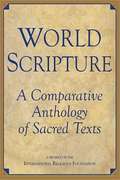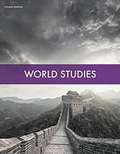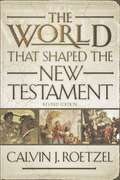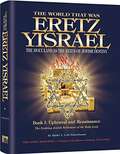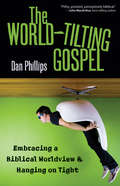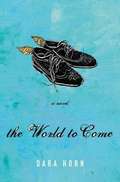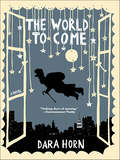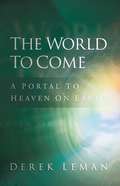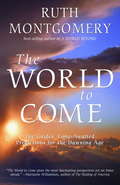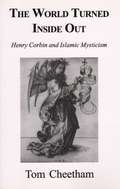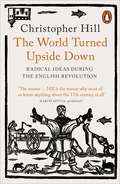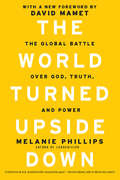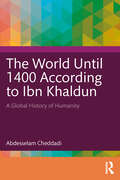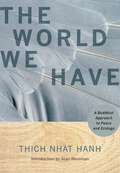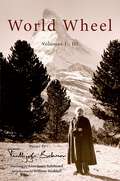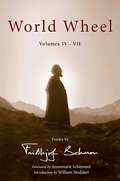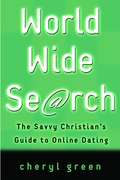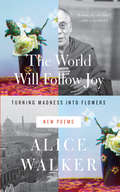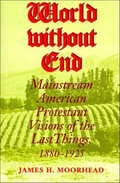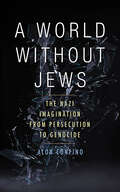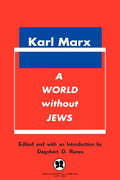- Table View
- List View
World Scripture: A Comparative Anthology of Sacred Texts
by Andrew WilsonDemonstrating the commonality of the world's religions and our common humanity, this rich and varied anthology of scripture offers a highly useful collection of religious quotations, passages, and excerpts from the holy texts, representing a new, holistic approach to the world's religions.
World Studies
by Dennis E. BollingerThe BJU Press World Studies 7th Grade curriculum provides students with a stirring, fascinating, chronological narrative of world history that reveals the hand of God at work among the nations. Covering 1,000 A.D. to the present, this text covers the birth of the Church, the rise of Islam, and a survey of world nations. Photos, maps, artwork, section review questions, and engaging margin boxes are integrated throughout. Each chapter ends with a chapter review that asks students to think in terms of higher learning, including understanding, analyzing, and evaluating. 408 pages with index and glossary, softcover. Grade 7.
World Studies (3rd Edition)
by Dennis BollingerWorld Studies Student Text begins with a brief review of history from Creation to the coming of Christ and progresses in a chronological journey around the world studying the ebb and flow of empires, cultures, Christianity, and world religions. It concludes with an examination of the trends of the emerging 21st century.
World Studies Activity Manual (3rd Edition)
by Dennis BollingerThis book arms students' further on the history they learn in class. Topics covered are: creation, cultures, dominant powers in Europe & Asia, the revolutionary age and the 20th century & beyond.
World Studies for Christian Schools (2nd edition)
by Terri Koontz Mark Sidwell S. M. BunkerAn introduction to and survey of world history from A.D. 1100 to 2000. It includes the Renaissance, the of European Reformation, the period transformation and colonialism, and the ideological and military conflicts of the twentieth century.
The World That Shaped the New Testament
by Calvin J. RoetzelIn this book, Calvin Roetzel explores the social, political, religious, and intellectual environment of the New Testament writers. Roetzel maps the major features of the first-century landscape so that the student may be able to view the whole, and through the whole gain new perspective on and insight into each part. Now updated with the most current scholarship and with revisions taking into account archeological findings, this is the best available introduction to the subject. Expanded materials include discussion of the social structure of Roman society, political dimensions of Pharisaism, Hellenistic religious expression, the Jewish Diaspora, the influence of the Septuagint on the Gospel writers and Paul, and women in antiquity. Pictures are integrated into the text at relevant points, the end of each chapter contains suggestions for further reading, and there is also a current and comprehensive bibliography of topics and authors.
The World That Was: Eretz Yisrael - The Holy Land As The Nexus Of Jewish Identity
by Rabbi A. Leib ScheinbaumTheWorld That Was: Eretz Yisrael is the riveting story of the unbreakable bond between Hashem, His People, and His beautiful, Holy Land.
The World-Tilting Gospel: Embracing a Biblical Worldview and Hanging on Tight
by Dan PhillipsThe first generation of Christians turned the world upside down. But the church today is being turned upside down by the world. Why? And why aren't we-with all our social medias and high-tech gadgets-more effectively producing Christ-centered, Gospel-liberated, biblically-instructed, world-tilting believers?
The World to Come
by Dara HornBy the winner of three national awards, a daring, ambitious, and wildly readable novel. A million-dollar painting by Marc Chagall is stolen from a museum. The unlikely thief is Benjamin Ziskind, a thirty-year-old quiz-show writer. As Benjamin and his twin sister try to evade the police, they find themselves recalling their dead parents - the father who lost a leg in Vietnam, the mother who created children's books - and their stories about trust, loss, and betrayal. What is true, what is fake, what does it mean? Eighty years before the theft, these questions haunted Chagall and the enigmatic Yiddish fabulist Der Nister ("The Hidden One"), teachers at a school for Jewish orphans. Both the painting and the questions will travel through time to shape the Ziskinds' futures. With astonishing grace and simplicity, Dara Horn interweaves a real art heist, history, biography, theology, and Yiddish literature. Richly satisfying, utterly unique, her novel opens the door to "the world to come" - not life after death, but the world we create through our actions right now.
The World to Come: A Novel
by Dara Horn"Nothing short of amazing." —Entertainment WeeklyA million-dollar Chagall is stolen from a museum during a singles' cocktail hour. The unlikely thief, former child prodigy Benjamin Ziskind, is convinced that the painting once hung in his parents' living room. This work of art opens a door through which we discover his family's startling history—from an orphanage in Soviet Russia where Chagall taught to suburban New Jersey and the jungles of Vietnam.
The World to Come: A Portal to Heaven on Earth
by Derek LemanExposes fallacies and false teaching about Heaven and Hell.
The World to Come: The Guides' Long-awaited Predictions for the Dawning Age
by Ruth MontgomeryIn The World to Come, best-selling author Ruth Montgomery presents a wealth of new material revisiting and recasting predictions made in her earlier books about who we are, where we are headed, and how we can cope with political and natural upheavals that loom in our future. During the 1960s, while working as a syndicated political columnist, Ruth Montgomery had an encounter with psychic phenomenon. Highly skeptical in the beginning, her exploration of the phenomenon eventually led to a series of articles and books. Through these writings, Ruth Montgomery has been at the forefront of popularizing such subjects as reincarnation, extraterrestrial visitation, life after death, and cataclysmic Earth changes. Many rank her remarkable powers of foresight with those of Nostradamus and Edgar Cayce. Now, in her first book in more than a dozen years, she again uses these powers to offer her readers a glimpse into our future. With the clarity and candor that has won her so many fans, Ruth gives a tour of the next century and beyond. She again discusses the dramatic shift of the Earth on its axis that her Guides say will be later than previously predicted, and she now provides information about what areas will be safest as the severe global weather patterns continue to intensify. Also, her Guides indicate that both the walk-in president and his nemesis are already here, but they will not reach major political positions until sometime in the next decade. In addition, Ruth shares the stories of numerous people from ancient Palestine, including herself, who have been reincarnated at this time to help bring peace and healing to the world. Finally, in what she intends as her farewell book, Ruth offers a warm and fascinating look at her own life and work.
The World Turned Inside Out
by Tom CheethamAn exploration of the works and ideas of Henry Corbin who introduced the notion of the imaginal to the West as well as explaining the mysticism of the Sufis.
The World Turned Upside Down: Radical Ideas During the English Revolution
by Christopher Hill'His finest work and one that was both symptom and engine of the concept of "history from below" ... Here Levellers, Diggers, Ranters, Muggletonians, the early Quakers and others taking advantage of the collapse of censorship to bid for new kinds of freedom were given centre stage ... Hill lives on' Times Higher EducationIn 'The World Turned Upside Down' Christopher Hill studies the beliefs of such radical groups as the Diggers, the Ranters, the Levellers and others, and the social and emotional impulses that gave rise to them. The relations between rich and poor classes, the part played by wandering 'masterless' men, the outbursts of sexual freedom, the great imaginative creations of Milton and Bunyan - these and many other elements build up into a marvellously detailed and coherent portrait of this strange, sudden effusion of revolutionary beliefs.'Established the concept of an "English Revolution" every bit as significant and potentially as radical as its French and Russian equivalents' Daily Telegraph'Brilliant ... marvellous erudition and sympathy' David Caute, New Statesman'This book will outlive our time and will stand as a notable monument to the man, the committed radical scholar, and one of the finest historians of the age' The Times Literary Supplement'The dean and paragon of English historians' E.P. Thompson
The World Turned Upside Down
by Melanie PhillipsIn what we tell ourselves is an age of reason, we are behaving increasingly irrationally. An astonishing number of people subscribe to celebrity endorsed cults, Mayan armageddon prophecies, scientism, and other varieties of new age, anti-enlightenment philosophies. Millions more advance popular conspiracy theories: AIDS was created in a CIA laboratory, Princess Diana was assassinated, and the 9/11 attacks were an inside job.In The World Turned Upside Down, Melanie Phillips explains that the basic cause of this explosion of irrationality is the slow but steady marginalization of religion. We tell ourselves that faith and reason are incompatible, but the opposite is the case. It was Christianity and the Hebrew Bible, Phillips asserts, that gave us our concepts of reason, progress, and an orderly world on which science and modernity are based.Without its religious traditions, the West has drifted into mass derangement where truth and lies, right and wrong, victim and aggressor are all turned upside down. Scientists skeptical of global warming are hounded from their posts, Israel is demonized, and the US is vilified over the war on terror-all on the basis of blatant falsehoods and obscene propaganda.Worst of all, asserts Phillips, this abandonment of rationality leaves the West vulnerable to its legitimate threats. Faced with the very real challenges of spiraling demographics and violent, confrontational Islamism, the West is no longer willing or able to defend the modernity and rationalism that it once brought into being.
The World Until 1400 According to Ibn Khaldun: A Global History of Humanity
by Abdesselam CheddadiThis book explores the significance of Ibn Khaldun’s magnum opus, the Book of Examples, to our understanding of human history and the disciplines of anthropology, history, and sociology.Operating outside of the confines of the Western intellectual tradition, Ibn Khaldun’s the Book of Examples is perhaps the first attempt to propose a global history of humanity. In doing so, Ibn Khaldun pioneered approaches from what we today term sociology, anthropology, ecology, economics, geography, and urban studies. Drawing upon the Muqaddima and the other volumes of the Kitab al-Ibar, Cheddadi proposes novel ways of viewing human history and classifying societies. While Ibn Khaldun’s attempts to develop a true global history were ultimately flawed, Cheddadi argues that they nevertheless offer pertinent lessons for our attempts to write a global history and to understand the world today.This stimulating and original work on a seminal figure in Islamic sociology and historiography will be of interest to students and researchers across the humanities and social sciences.
The World We Have: A Buddhist Approach to Peace and Ecology
by Thich Nhat HanhIn The World We Have peace activist and venerable Buddhist teacher Thich Nhat Hanh offers a dramatic vision of the future of our planet facing multiple crises. Thich Nhat Hanh finds answers to the critical problems of our time in the Buddhist teaching of the impermanence. He demonstrates how this teaching can offer inner peace and help us use our collective wisdom and capability to restore the Earth's balance.Mixing inspiring insights with practical strategies, Thich Nhat Hanh cites projects that the Plum Village monastic community has undertaken that can serve as models for any community. Both his "No Car Day," observed once a week, and the "Earth Peace Treaty Commitment Sheet" can positively change our impact on the Earth.Above all, Thich Nhat Hanh shows how acceptance of the problems is that first critical step toward a deeper understanding of the best way to care for our Earth.The World We Have includes Thich Nhat Hanh&’s speech at UNESCO from October 2006 introducing his proposal for a global "No Car Day."Foreword by Alan Weisman, author of Hope Dies Last: Visionary People Across the World, Fighting to Find Us a Future.
World Wheel Vol. I-Iii: Poems By Frithjo
by Frithjof SchuonDuring the last three years of his life Frithjof Schuon wrote approximately 3,500 poems in his mother tongue German. These poems express every conceivable subtlety of spiritual and moral counsel, and the same sharpness of intellect, profundity, comprehensiveness, and compassion which one finds in Schuon&’s other writings.
World Wheel Vol. Iv-Vii: Poems By Frithj
by Frithjof SchuonDuring the last three years of his life Frithjof Schuon wrote approximately 3,500 poems in his mother tongue German. These poems express every conceivable subtlety of spiritual and moral counsel, and the same sharpness of intellect, profundity, comprehensiveness, and compassion which one finds in Schuon&’s other writings.
World Wide Search: The Savvy Christian's Guide to Online Dating
by Cheryl GreenFind a Soul-Deep Relationship Online.In today's fast-paced world, singles are turning to the Internet in the hopes of finding a relationship that goes deeper than superficial conversation. As many as 3,000 Christian matchmaker web sites boast more than 2 million members. But with so much happening online, how can a person know the best place to start and how to proceed? Online dating has the potential to put a meaningful soul connection literally at your fingertips. The search for a special relationship via the Internet holds great promise, but also significant risk. Fortunately, the support and guidance in this book can point you in the right direction, make you aware of the dangers, and prepare you to enjoy the unique blessings of dating online. World Wide Search will increase your effectiveness by helping you: ·Tap into crucial, Bible-based insights and support.·Determine if the timing is right for online dating.·Evaluate your goals and expectations before the first date.·Master the skill of safe online communication.·Reduce your chances for hurt and disappointment.·Find an authentic, soul-deep connection online. Whether you are new to online dating or simply looking for ways to improve your approach, this is the supportive, trustworthy guide you need to help you succeed as you seek "the one" online.From the Trade Paperback edition.
The World Will Follow Joy: Turning Madness into Flowers (New Poems)
by Alice WalkerA poetry collection of &“playful and crooning lyricism&” from the National Book Award– and Pulitzer Prize–winning author of The Color Purple (Booklist). In this dazzling new collection, Alice Walker offers over sixty new poems to incite and nurture contemporary activists. Hailed as a &“lavishly gifted writer,&” Walker imbues her poetry with evocative images, fresh language, anger, forgiveness, and profound wisdom (The New York Times). Casting her eye toward history, politics, and nature, as well as to world figures such as Jimmy Carter, Gloria Steinem, and the Dalai Lama, she &“distills struggles, crises, and tragedies down to bright, singing lessons in living with awareness and joy&” (Booklist). By attentively chronicling the conditions of human life today, Walker shows, as ever, her deep compassion, profound spirituality, and necessary political commitments. The poems in The World Will Follow Joy remind us of our human capacity to come together and take action, even in our troubled political times. &“Her spirituality, concern for human rights, and almost old-fashioned, determined joyousness run deep and her devoted readers will want to follow her as she turns &‘madness into flowers&’&” (Library Journal).
World without End: Mainstream American Protestant Visions of the Last Things, 1880–1925 (Religion in North America)
by James H. Moorhead"In this compelling intellectual and social history, Moorhead argues that for mainline Protestants in the late 19th century, time became endless, human-directed and without urgency. . . . Moorhead offers some brilliant observations about the legacy of postmillennialism and the human need for a definitive eschaton." —Publishers WeeklyIn the 19th century American Protestants firmly believed that when progress had run its course, there would be a Second Coming of Christ, the world would come to a supernatural End, and the predictions in the Apocalypse would come to pass. During the years covered in James Moorhead's study, however, moderate and liberal mainstream Protestants transformed this postmillennialism into a hope that this world would be the scene for limitless spiritual improvement and temporal progress. The sense of an End vanished with the arrival of the new millennium.
A World Without Jews: The Nazi Imagination from Persecution to Genocide
by Alon ConfinoA groundbreaking reexamination of the Holocaust and how Germans understood their genocidal project: “Insightful [and] chilling.” —Kirkus ReviewsWhy exactly did the Nazis burn the Hebrew Bible everywhere in Germany on November 9, 1938? The perplexing event has not been adequately accounted for by historians in their large-scale assessments of how and why the Holocaust occurred. In this gripping new analysis, Alon Confino draws on an array of archives across three continents to propose a penetrating new assessment of one of the central moral problems of the twentieth century. To a surprising extent, Confino demonstrates, the mass murder of Jews during the war years was powerfully anticipated in the culture of the prewar years.The author shifts his focus away from the debates over what the Germans did or did not know about the Holocaust and explores instead how Germans came to conceive of the idea of a Germany without Jews. He traces the stories the Nazis told themselves—where they came from and where they were heading—and how those stories led to the conclusion that Jews must be eradicated in order for the new Nazi civilization to arise. The creation of this new empire required that Jews and Judaism be erased from Christian history, and this was the inspiration—and justification—for Kristallnacht. As Germans entertained the idea of a future world without Jews, the unimaginable became imaginable, and the unthinkable became real.“At once so disturbing and so hypnotic to read . . . Deserves the widest possible audience.” —Open Letters Monthly
A World Without Jews
by Dagobert D. RunesA World Without Jews by Karl Marx speaks about religious prejudice specifically against Jews. It begs to question can the world survive without this prejudice and how Jews beg for political emancipation?Karl Marx (1818-1883) is best known not as a philosopher but as a revolutionary communist, whose works inspired the foundation of many communist regimes in the twentieth century. It is hard to think of many who have had as much influence in the creation of the modern world. Trained as a philosopher, Marx turned away from philosophy in his mid-twenties, towards economics and politics. However, in addition to his overtly philosophical early work, his later writings have many points of contact with contemporary philosophical debates, especially in the philosophy of history and the social sciences, and in moral and political philosophy. Historical materialism -- Marx's theory of history -- is centered around the idea that forms of society rise and fall as they further and then impede the development of human productive power. Marx sees the historical process as proceeding through a necessary series of modes of production, culminating in communism. Marx's economic analysis of capitalism is based on his version of the labour theory of value, and includes the analysis of capitalist profit as the extraction of surplus value from the exploited proletariat. The analysis of history and economics come together in Marx's prediction of the inevitable economic breakdown of capitalism, to be replaced by communism. However Marx refused to speculate in detail about the nature of communism, arguing that it would arise through historical processes, and was not the realisation of a pre-determined moral ideal.
A World Without Tyranny
by Dean C. CurryA Christian faith based approach to international relations and global politics.
